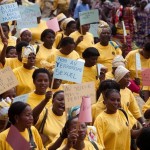A “real man” respects a woman
Our Chief Program Officer, Lena Slachmuijlder, was recently interviewed by Men Can Stop Rape (MCSR) regarding SFCG’s strategy to prevent sexual and gender-based violence (SGBV) in the DRC which engages men as equal partners and stakeholders. The first part of the interview can be found here.
Men Can Stop Rape aims to mobilize men to create cultures free from violence, especially against women. They support and initiate programs that generate positive role models which reinforce their vision. Lena’s interview is part of MCSR’s masculinity conversation series and is published in two parts.
Lena spoke of her experience leading SFCG DRC, where she was Country Director. In the interview she gives an inside view of how the campaign of Vrai Djo came to life and what experiences she and her team had with it. The campaign provides examples of how men can respect women without loosing their manliness. For example, a husband doesn’t beat his wife when she comes home late, but on the contrary, surprises her with an already cooked dinner. He is the example of a Vraj Djo (a real man).
Lena explains in the interview: “Vrai” means true in French, and “djo” means sort of like the guy, so it means “true guy,” “cool guy.” Like if you imagine a girlfriend saying, “Is he the real one? Is he the right one?”
Another example where a man displays real respect for a woman is a video clip about a soldier who finds a woman on the field, totally exhausted from the work. He does not take advantage of her situation but brings her home safely. The clip is especially important as soldiers are among the most named perpetrators of rape in the Congo.
Lena says: “We’ve identified a whole range of dimensions that can influence the soldiers to want to be a man who protects, not harms. Part of getting there is empathy, through viewing testimonies of rape survivors, and talking about it afterwards, “How would you feel if that’s your daughter,” that kind of thing.”
Lena helped to find the famous musician Celeo Scram, who was part of Werrasson’s band for 10 years, and who is the main character in the spots. She also followed the mobile cinema that traveled to rural areas to screen the spots to a wider audience.
There, she experienced what stood most out to her in her work: “By 8:30 the film was over, and the discussion is drawing to a close by 9pm. It’s dark, we’ve got a little spotlight and microphone there, and some of the women who did come and watch the films have dwindled away, along with some of the older people. Some of the kids are all still there, but there’s this group of young men between 14 and 25, who are really adamant about talking and saying it’s the women’s fault. They stay late, and we’re not playing music to keep them there. They’re talking in a way that is more extreme than I would expect. They’re saying things that I feel they should be a little embarrassed to say in the Congolese culture. I lived there for a long time, and I found that what they said was hitting a chord of what needed to be addressed – that extreme feeling of ’this is against me,’ ’empowering women is an assault on me, telling me that women are the only victims is an assault on me.’ ’Don’t you realize all the problems that I have?’ ’Don’t you realize that I have needs?’ I felt that that was really powerful.”










Ms Slachmuijlder has a sexist attitude that dismisses men. Some critique here: http://www.genderratic.com/?p=661#comments
How can she teach men to respect women, when she disrespects men? One must lead by example to achieve change.
I’m glad that you read SFCG’s blog and we encourage dialogue and exchanges about the very complex topics around which we focus our work. With this in mind, I would like to respond to a few of your comments:
You explained that you were not sure whether the MCSR interview was saying that Lena Slachmuijlder was sharing the actual thoughts of the men she spoke with or her assumptions about the experiences that led to them saying that they had been raped. Here is the full quote from the article:
“But we often found that these sensitizations were creating another reaction on behalf of the men in the audiences. They felt as though they were not getting attention; they invariably stood up and said that they, men, had been raped. But that was coming largely from feeling disempowered. They would often use this phrase, “Women are raping us” referring to the way that women dress or the fact that they have money, giving the impression that the men are unable to resist, and the women are able do whatever they want.”
In this description, Ms. Slachmuijlder was reflecting back men’s reactions to sensitization about rape of women. The men to whom she refers were not actual victims of rape. This is because, wrongfully, rape is associated with so much societal shame that people rarely – and men very rarely – stand up publicly to testify that they’ve been raped. This in no way was meant to disrespect the thousands of men, as you rightly point out, who are actual victims of rape. Ms. Slachmuijlder knows, from her work in Congo, of the tremendous challenges that male victims of rape face – too often in the shadows of silence and solitude.
Our work does not deny that rape is being committed against men in the DRC. And while statistics show us that the vast majority of rape is committed by men on women, SFCG’s work does not demonize men. In fact, the ‘Vrai Djo’ project was aimed specifically at sounding a positive resonance for Congolese men across the country that treats women with dignity and respect. Ms. Slachmuijlder has witnessed time and time again the positive role that Congolese men are playing in supporting their wives, mothers, daughters, sisters, and other women in their communities. This positive role has been reflected in numerous activities by SFCG in the DRC, in which men are portrayed as people capable of making a choice, doing the right thing, and standing up against injustice. The “Vrai Djo” project was developed in consultation with men specifically to be inclusive, as too often initiatives that address SGBV do not engage men as partners, only perpetrators. Rather than dismissing men, Ms. Slachmuijlder’s work in the DRC has been notable for its inclusiveness, while holding out the possibility for positive change.